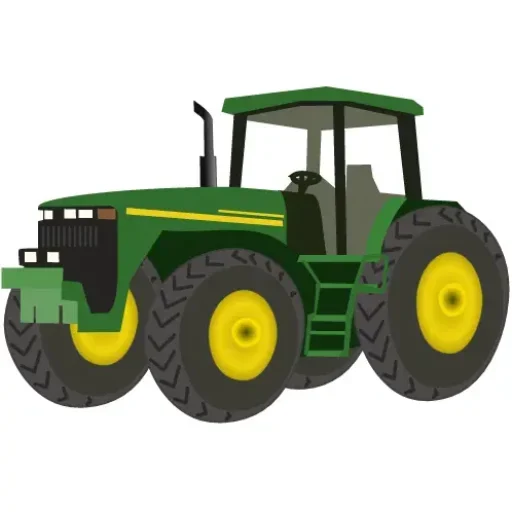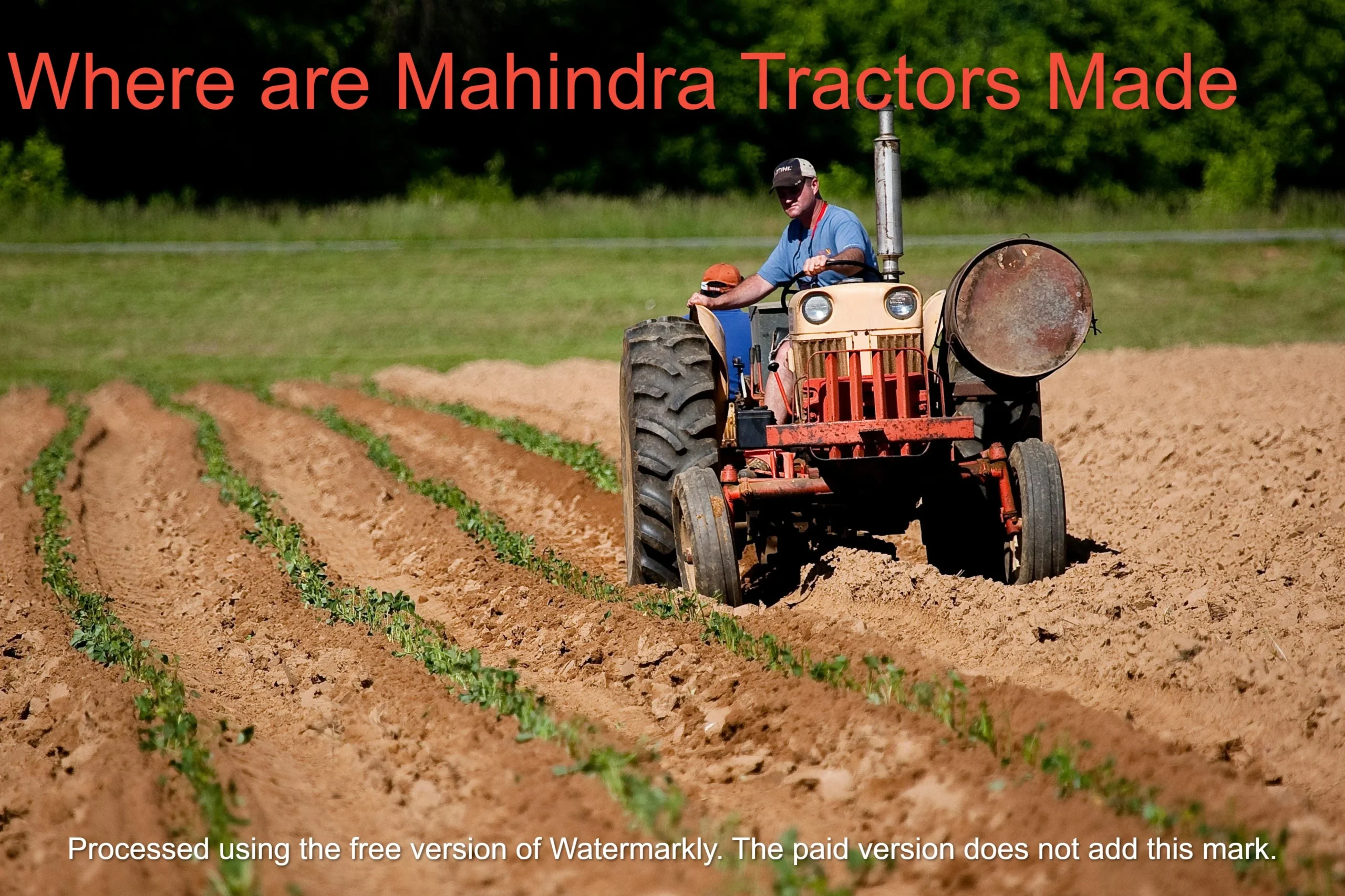Mahindra tractors are primarily manufactured in India, with production facilities located in various parts of the country, including Maharashtra, Gujarat, and Punjab. These tractors are known for their robust build quality, reliability, and versatility, catering to the diverse needs of farmers worldwide. Mahindra’s commitment to innovation and technology has made their tractors popular across the globe, serving agricultural communities in over 40 countries.
Introduction
Mahindra & Mahindra Ltd., the prominent Indian multinational corporation, is renowned for its diverse range of products, including automobiles, farm equipment, and more. Among their offerings, Mahindra tractors hold a significant position in the global agricultural machinery market. These tractors are not only popular in India but are also exported to various countries worldwide.
As consumers become increasingly conscious of product origins and manufacturing practices, the question “Where are Mahindra Tractors Made?” gains more prominence. This article aims to provide a comprehensive overview of Mahindra’s tractor manufacturing facilities, exploring the company’s global footprint and the factors that contribute to the quality and reliability of these agricultural workhorses.
Mahindra’s Global Manufacturing Presence
Mahindra & Mahindra Ltd. has a well-established global manufacturing presence, with facilities strategically located across multiple countries. This diverse network of production plants allows the company to cater to local and international markets more effectively while maintaining quality standards.
India: The Heart of Mahindra’s Tractor Production
India serves as the primary manufacturing hub for Mahindra tractors. The company has several state-of-the-art tractor production facilities situated throughout the country, including:
- Zaheerabad Plant, Telangana: Established in 1994, this plant is Mahindra’s largest tractor manufacturing facility. It produces a wide range of tractors, from small horsepower models to heavy-duty variants, catering to both domestic and export markets.
- Kandivali Plant, Mumbai: Located in the heart of Mumbai, this facility focuses on producing compact and sub-compact tractor models, primarily for the domestic market.
- Rudrapur Plant, Uttarakhand: This plant, situated in the northern state of Uttarakhand, specializes in manufacturing tractor components and assembling certain tractor models.
- Jaipur Plant, Rajasthan: Mahindra’s facility in Jaipur is dedicated to producing transmission components and gearboxes for tractors.
These Indian plants leverage advanced manufacturing technologies, stringent quality control processes, and a skilled workforce to ensure the consistent production of high-quality tractors.
Mahindra’s Global Footprint
While India remains the company’s primary manufacturing base, Mahindra has also established tractor production facilities in other countries to better serve international markets and optimize logistics. These facilities include:
- United States: Mahindra’s plant in Bloomsburg, Pennsylvania, caters to the North American market, producing a range of tractors specifically designed for American agricultural requirements.
- China: In partnership with Jiangsu Yueda Group, Mahindra operates a manufacturing facility in Yangzhou, China, serving the Chinese and adjacent markets.
- Japan: Through a joint venture with Mitsubishi Agricultural Machinery, Mahindra has a tractor production facility in Sakurai, Japan, catering to the Japanese market and leveraging advanced Japanese manufacturing technologies.
- Turkey: Mahindra’s partnership with Erkunt Tractor, a leading Turkish tractor manufacturer, has led to the establishment of a production facility in Ankara, Turkey, serving the European and Middle Eastern markets.
These global manufacturing facilities not only enable Mahindra to meet local demand more efficiently but also contribute to the company’s commitment to sustainability by reducing transportation emissions and fostering local employment opportunities.
Factors Contributing to Mahindra’s Tractor Quality
Mahindra’s reputation for producing high-quality and reliable tractors can be attributed to several key factors, including:
Advanced Manufacturing Technologies
Mahindra’s tractor production facilities are equipped with cutting-edge manufacturing technologies and automated processes. These technologies include computer-aided design (CAD), computer-aided manufacturing (CAM), robotics, and advanced quality control systems. By leveraging these technologies, Mahindra ensures consistent quality, precision, and efficiency in its tractor manufacturing processes.
Stringent Quality Control Measures
Mahindra places a strong emphasis on quality control throughout the entire manufacturing process. The company implements rigorous testing and inspection procedures at various stages of production, ensuring that every tractor meets or exceeds industry standards and customer expectations. These quality control measures include component testing, performance testing, and comprehensive final inspections.
Skilled Workforce and Training
Mahindra recognizes the importance of a skilled and well-trained workforce in producing high-quality products. The company invests significantly in employee training programs, equipping its workers with the necessary knowledge and skills to operate advanced manufacturing equipment and adhere to stringent quality standards.
Continuous Improvement and Innovation
Mahindra is committed to continuous improvement and innovation in its tractor manufacturing processes. The company actively seeks feedback from customers, dealers, and industry experts, utilizing this valuable input to refine and enhance its products and manufacturing methods. Additionally, Mahindra’s dedicated research and development teams work tirelessly to develop new technologies and innovations that improve tractor performance, efficiency, and user experience.
Sustainability and Environmental Consciousness
Mahindra is keenly aware of the environmental impact of its operations and has implemented various sustainability initiatives across its manufacturing facilities. These efforts include energy-efficient production processes, waste reduction strategies, and the incorporation of eco-friendly materials and technologies into its tractors. By prioritizing sustainability, Mahindra not only contributes to environmental preservation but also ensures the long-term viability of its operations.
Mahindra Tractor Models and Applications
Mahindra offers a diverse range of tractor models designed to meet the varying needs of farmers, landscapers, and other agricultural professionals. Here are some of the company’s popular tractor series and their applications:
| Tractor Series | Horsepower Range | Applications |
|---|---|---|
| Yuvo | 22 – 42 HP | Small-scale farming, orchards, vineyards, landscaping |
| Arjun Novo | 35 – 62 HP | General farming, horticulture, dairy operations |
| Sarpanch | 50 – 60 HP | Rice farming, medium-sized agricultural operations |
| Retriever | 55 – 85 HP | Livestock farming, hay and forage operations |
| 6000 Series | 68 – 97 HP | Large-scale farming, commercial agriculture |
| 8500 Series | 80 – 105 HP | Heavy-duty farming, construction, and utility tasks |
In addition to these popular models, Mahindra also offers specialized tractors for specific applications, such as orchard tractors, row crop tractors, and tractors designed for vineyards and plantations.
Mahindra Tractor Distribution and Exports
Mahindra’s tractor distribution network is extensive, spanning both domestic and international markets. Within India, the company has a robust network of dealers and authorized service centers, ensuring easy access to sales, service, and spare parts for customers across the country.
On the global front, Mahindra exports its tractors to over 60 countries, with a strong presence in markets such as the United States, Canada, Australia, Europe, Africa, and Asia. The company has established strategic partnerships and distribution agreements with local dealers and distributors in these regions, enabling efficient sales, service, and support for its tractors.
Mahindra’s commitment to quality, innovation, and customer satisfaction has played a crucial role in the company’s success in the global tractor market. By continuously expanding its manufacturing footprint and distribution networks, Mahindra aims to strengthen its position as a leading provider of agricultural machinery worldwide.
Conclusion
In conclusion, Mahindra tractors are manufactured at various state-of-the-art facilities across India and in strategic global locations to cater to both domestic and international markets. The company’s commitment to advanced manufacturing technologies, stringent quality control measures, skilled workforce development, continuous improvement, and sustainability has solidified its position as a leading producer of high-quality and reliable tractors.
Mahindra’s diverse range of tractor models, designed to meet the varying needs of farmers, landscapers, and agricultural professionals, coupled with its extensive distribution network, has enabled the company to establish a strong global presence and gain the trust of customers worldwide.
As the demand for efficient and sustainable agricultural machinery continues to grow, Mahindra remains well-positioned to meet these challenges, leveraging its expertise, innovation, and dedication to delivering superior products and services to farmers and agricultural professionals around the globe.
FAQs about Mahindra Tractors
Q1: Are all Mahindra tractors manufactured in India?
No, while India is the primary manufacturing hub for Mahindra tractors, the company also has production facilities in other countries, such as the United States, China, Japan, and Turkey. These global facilities cater to local and regional markets, ensuring efficient distribution and compliance with local regulations and standards.
Q2: What quality standards do Mahindra’s tractor manufacturing facilities adhere to?
Mahindra’s tractor manufacturing facilities follow stringent quality control measures and adhere to international quality standards, such as ISO 9001. The company implements rigorous testing and inspection procedures at various stages of production to ensure that every tractor meets or exceeds industry standards and customer expectations.
Q3: Does Mahindra offer specialized tractors for specific applications?
Yes, in addition to its mainstream tractor models, Mahindra offers specialized tractors designed for specific applications, such as orchard tractors, row crop tractors, and tractors tailored for vineyards and plantations. These specialized tractors are engineered to meet the unique requirements of different agricultural operations.
Q4: How does Mahindra ensure the sustainability of its tractor manufacturing operations?
Mahindra is committed to sustainability and has implemented various eco-friendly initiatives across its manufacturing facilities. These include energy-efficient production processes, waste reduction strategies, and the incorporation of environmentally friendly materials and technologies into its tractors. The company also focuses on reducing transportation emissions by establishing local manufacturing facilities in key markets.
Q5: Where can I find Mahindra’s authorized dealers and service centers?
Mahindra has a robust network of authorized dealers and service centers worldwide. Within India, you can locate your nearest dealer or service center by visiting the company’s website or contacting their customer support hotline. For international markets, Mahindra has established partnerships with local dealers and distributors, ensuring easy access to sales, service, and spare parts in your region.

